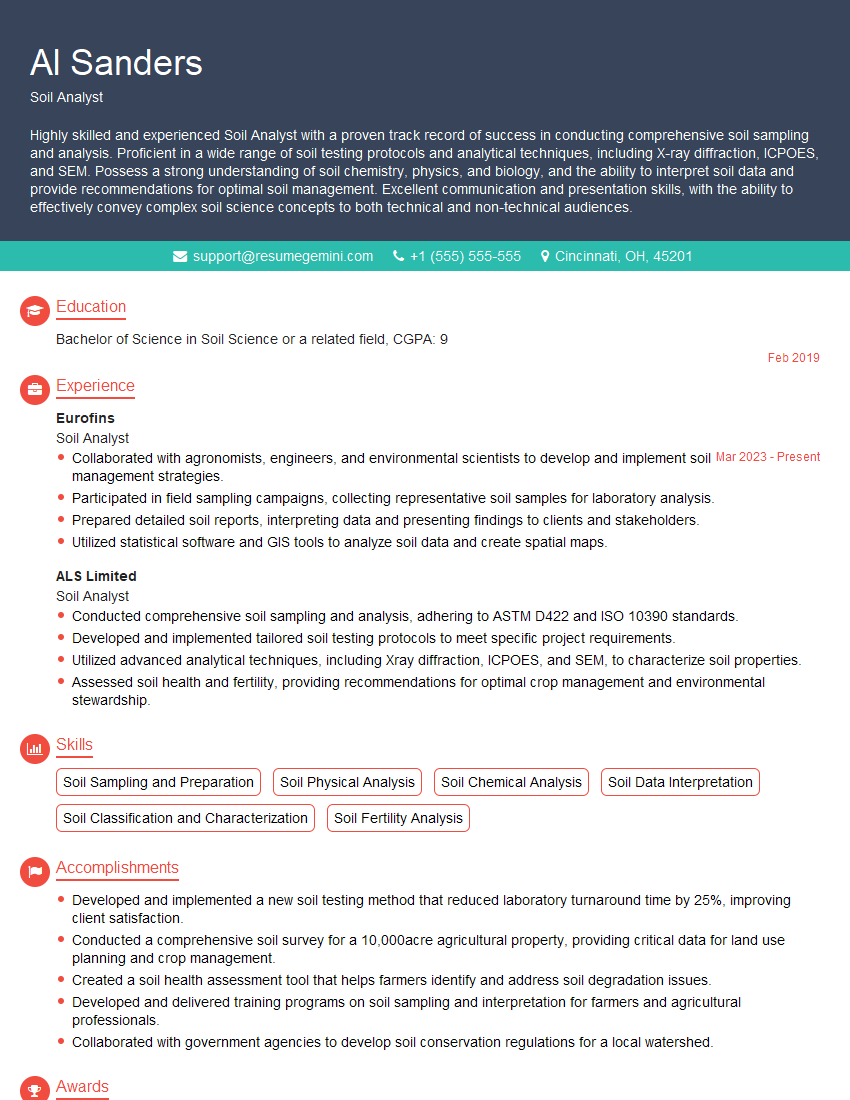Are you a seasoned Soil Analyst seeking a new career path? Discover our professionally built Soil Analyst Resume Template. This time-saving tool provides a solid foundation for your job search. Simply click “Edit Resume” to customize it with your unique experiences and achievements. Customize fonts and colors to match your personal style and increase your chances of landing your dream job. Explore more Resume Templates for additional options.

Al Sanders
Soil Analyst
Summary
Highly skilled and experienced Soil Analyst with a proven track record of success in conducting comprehensive soil sampling and analysis. Proficient in a wide range of soil testing protocols and analytical techniques, including X-ray diffraction, ICPOES, and SEM. Possess a strong understanding of soil chemistry, physics, and biology, and the ability to interpret soil data and provide recommendations for optimal soil management. Excellent communication and presentation skills, with the ability to effectively convey complex soil science concepts to both technical and non-technical audiences.
Education
Bachelor of Science in Soil Science or a related field
February 2019
Skills
- Soil Sampling and Preparation
- Soil Physical Analysis
- Soil Chemical Analysis
- Soil Data Interpretation
- Soil Classification and Characterization
- Soil Fertility Analysis
Work Experience
Soil Analyst
- Collaborated with agronomists, engineers, and environmental scientists to develop and implement soil management strategies.
- Participated in field sampling campaigns, collecting representative soil samples for laboratory analysis.
- Prepared detailed soil reports, interpreting data and presenting findings to clients and stakeholders.
- Utilized statistical software and GIS tools to analyze soil data and create spatial maps.
Soil Analyst
- Conducted comprehensive soil sampling and analysis, adhering to ASTM D422 and ISO 10390 standards.
- Developed and implemented tailored soil testing protocols to meet specific project requirements.
- Utilized advanced analytical techniques, including Xray diffraction, ICPOES, and SEM, to characterize soil properties.
- Assessed soil health and fertility, providing recommendations for optimal crop management and environmental stewardship.
Accomplishments
- Developed and implemented a new soil testing method that reduced laboratory turnaround time by 25%, improving client satisfaction.
- Conducted a comprehensive soil survey for a 10,000acre agricultural property, providing critical data for land use planning and crop management.
- Created a soil health assessment tool that helps farmers identify and address soil degradation issues.
- Developed and delivered training programs on soil sampling and interpretation for farmers and agricultural professionals.
- Collaborated with government agencies to develop soil conservation regulations for a local watershed.
Awards
- Received the Soil Science Society of Americas Young Scientist Award for outstanding research in soil chemistry.
- Recognized by the Association of Soil Scientists for contributions to the field of soil fertility management.
- Awarded a grant from the National Science Foundation to study the impact of soil erosion on water quality.
- Received a scholarship from the Soil Science Society of America for academic excellence and research potential.
Certificates
- Certified Soil Scientist (SSS)
- Certified Professional Soil Scientist (CPSS)
- Certified Soil Erosion and Sediment Control Professional (CPESC)
- Certified Crop Adviser (CCA)
Career Expert Tips:
- Select the ideal resume template to showcase your professional experience effectively.
- Master the art of resume writing to highlight your unique qualifications and achievements.
- Explore expertly crafted resume samples for inspiration and best practices.
- Build your best resume for free this new year with ResumeGemini. Enjoy exclusive discounts on ATS optimized resume templates.
How To Write Resume For Soil Analyst
- Highlight your technical skills and experience in soil sampling and analysis.
- Showcase your understanding of soil chemistry, physics, and biology.
- Demonstrate your ability to interpret soil data and provide recommendations for soil management.
- Provide examples of your work and how it has impacted soil health and crop yields.
- Proofread your resume carefully for any errors.
Essential Experience Highlights for a Strong Soil Analyst Resume
- Conduct soil sampling and preparation according to established protocols.
- Perform soil physical and chemical analysis to determine soil properties.
- Interpret soil data to assess soil health and fertility.
- Develop tailored soil testing protocols to meet specific project requirements.
- Collaborate with agronomists, engineers, and environmental scientists to develop soil management plans.
- Prepare detailed soil reports and present findings to clients and stakeholders.
- Stay abreast of the latest soil science research and technologies.
Frequently Asked Questions (FAQ’s) For Soil Analyst
What is the role of a Soil Analyst?
Soil Analysts are responsible for collecting, analyzing, and interpreting soil data to assess soil health and fertility. They provide recommendations for optimal soil management practices to farmers, landowners, and environmental scientists.
What are the educational requirements for a Soil Analyst?
Most Soil Analysts have a Bachelor’s degree in Soil Science, Agronomy, Environmental Science, or a related field.
What are the key skills for a Soil Analyst?
Key skills for a Soil Analyst include soil sampling and preparation, soil physical and chemical analysis, soil data interpretation, and soil management planning.
What is the job outlook for Soil Analysts?
The job outlook for Soil Analysts is expected to be good, with a projected growth rate of 5% over the next decade.
What are the earning prospects for Soil Analysts?
The median annual salary for Soil Analysts is around $60,000.
What are the career advancement opportunities for Soil Analysts?
Soil Analysts can advance to positions such as Soil Scientist, Environmental Consultant, or Research Scientist.
What are the challenges of working as a Soil Analyst?
The challenges of working as a Soil Analyst include working in outdoor conditions, exposure to chemicals, and the need to stay abreast of the latest soil science research and technologies.